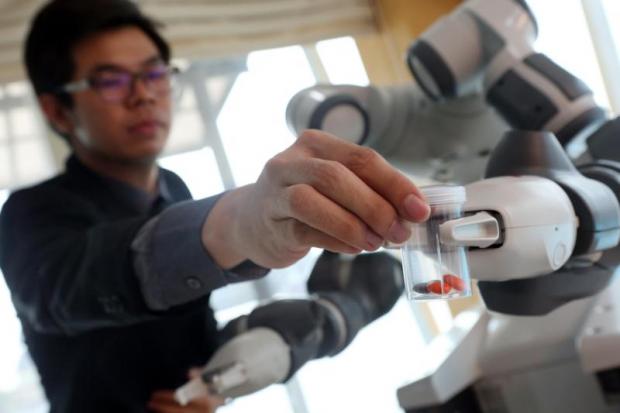
Workforce, availability of frequency spectrum and data protection laws are key success factors in promoting the Internet of Things in Thailand as the country's digital transformation gets underway, technology experts said during an IoT panel discussion.
Thailand is set to become an ageing society and that will make the cost of taking care of patients grow faster than the country's GDP. IoT will play a crucial role in solving this problem, said Cherdchai Nopmaneejumruslers, vice hospital director at Siriraj Hospital.
To boost confidence in IoT adoption, policymakers need to beef up data privacy laws because IoT encompasses personal information and patients' records. The availability of frequency spectrum is very much needed to avoid signal interference, he said.
Sak Segkhoonthod, president of the Electronic Government Agency (EGA), said the National Broadcasting Telecommunication Commission will allocate dedicated spectrum for the government's IoT network. Previously, the NBTC had tentatively identified spectrum in the 920-925 megahertz band for IoT access under the unlicensed platform.
IoT can enhance workforce productivity, said Mr Cherdchai, citing the example of wearable devices or sensors embedded in the socks or clothes of patients that allow doctors to detect their personal health data, including blood pressure and heart rate.
"All these things can better serve preventive care," he said.
Mr Sak said over the next four months, Siriraj Hospital will introduce a queue management mobile application which will enable the patients to cut down on waiting time.
Early next year, the hospital will roll out its first robotic medicine distribution system developed by Thai developers in collaboration with the Thailand Centre of Excellence for Life Science and Institute of Field Robotics.
Fong Yue Yeng, vice president of Industry Platform Pte, an organiser of Asia IoT Business Platform, said IoT will efficiently help drive Thailand 4.0 and digital transformation.
A recent survey of 400 respondents conducted by Asia IoT Business Platform in the second quarter found that 73.3% of Asean enterprises and organisations are currently in the process of exploring or finding possible IoT solutions, an increase of 23.3% from 2016. Frost & Sullivan forecasts that IoT spending in Thailand will grow 1600% by 2020.
In spite of the frenzied search for IoT solutions, many challenges remain. Close to three-quarters of firms surveyed said they are interested in IoT, but only 7% have successfully implemented IoT technology. Cost, incompatibility with legacy technologies and complexity were the top three concerns cited.
Axel Winter, CTO of Central group, says privacy is the top concern for consumers.
The private sector has called for increased financial support from the government and for clearer regulations in the industry.
When asked what IoT developers in the private sector wanted from the Thai government, Hidenori Furukawa, a partner at KPMG Thailand, said changing the educational system is crucial.
"As an advisory firm, our greatest challenge is integrating all of these new technologies developed by different people in different computer languages into a single solution for a single problem. People with a general perspective who are able to see how the points connect are needed in addition to specialists," he said.
The Thai university system encourages students to focus on a single subject to the detriment of others, even in the early stages of their education, said Mr. Furukawa.
"Undergraduates should be able to explore different academic areas and see how they connect", he said.
Adisak Srinakarin, EGA executive vice president, condemned the government's approach to incentivising innovation and technology development.
"The Thai government will move with full force in the IoT sector, despite the risks and warnings. But it doesn't matter how much money you pour into the IoT industry. It will have little effect if these incentives are not used efficiently and strictly monitored," he said. "Financial incentives are not the sole or even the most effective incentive. An even better incentive for foreign investors would be a less corrupt government, which is what we're working to achieve."
Dr Adisak said that promulgating laws themselves is not the problem, even when it comes to privacy issues in the IoT sector.
"The prime minister can at any time use Section 44 to enact regulations on a variety of subjects. The problem is enforcing the laws, especially in a complex industry like IoT," said Dr Adisak.
The EGA has already begun its efforts to improve enforcement. For example, it is pushing all ministries to transfer their business from paper to digital formats.
"A lot of people thought our goal was to reduce the consumption of paper. Our goal was actually to combine data from all ministries into a single database, which will make it harder to evade regulations," he said.
The EGA vice president also said that the government will take a more hands on approach in R&D. In the past the government has sent professors to the best universities in the world and brought them back to do research here, said Dr Adisak.
"Unfortunately, there was too much talk and too little action. Thai universities have taken too much time developing prototypes, so much time in fact, that by the time they are ready to be commercialised they are already obsolete," he said. "We are committed to bringing together a talented team including foreigners and Thai nationals, who can turn out products quickly."